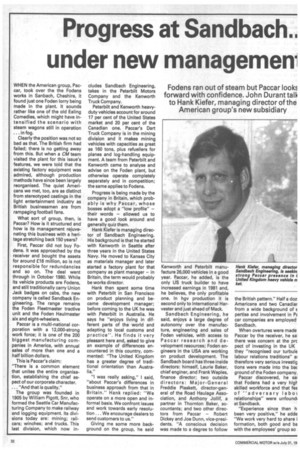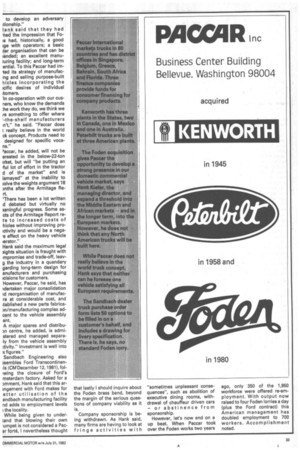Progress at Sandbach..
Page 26

Page 27

If you've noticed an error in this article please click here to report it so we can fix it.
under new managemeni
Fodens ran out of steam but Paccar IookE forward with confidence. John Durant talk to Hank Kiefer, managing director of the American group's new subsidiary
WHEN the American group, Paccar, took over the the Fodens works in Sanbach, Cheshire, it found just one Foden lorry being made in the plant. It sounds rather like one of the old Ealing Comedies, which might have intensified the scenario with steam wagons still in operation ... in fog.
Clearly the position was not so bad as that. The British firm had failed; there is no getting away from this. But when a CM team visited the plant for this issue's features, we were told that the existing factory equipment was admired, although production methods have since been largely reorganised. The quiet Americans we met, too, are as distinct from stereotyped castings in the light entertainment industry as British businessmen are from rampaging football fans.
What sort of group, then, is Paccar? How is it structured and how is its management rejuvenating this business with a heritage stretching back 150 years?
First, Paccar did not buy Fodens. It was approached by the receiver and bought the assets for around £18 million, so is not responsible for redundancies and so on. The deal went through in October 1980. While its vehicle products are Fodens, and still traditionally carry Union Jack badges on cabs, the new company is called Sand back Engineering. The range remains the Foden Fleetmaster tractive unit and the Foden Haulmaster six and eight-wheelers.
Paccar is a multi-national corporation with a 12,000-strong work force; it is one of the 200 biggest manufacturing companies in America, with annual sales of more than one and a half billion dollars.
This is Paccar's claim: "There is a common element that unites the entire organisation, establishing the chief aspect of our corporate character.
. "And that is quality."
The group was founded in 1905 by William Pigott, Snr, who formed the Seattle Car Manufacturing Company to make railway and logging equipment. Its divisions today are: mining; railcars; winches; and trucks. This last division, which now in cludes Sandbach Engineering, takes in the Peterbilt Motors Company and the Kenworth Truck Company.
Peterbilt and Kenworth heavyduty vehicles account for around 17 per cent of the United States market and 20 per cent of the Canadian one. Paccar's Dart Truck Company is in the mining division and it makes mining vehicles with capacities as great as 160 tons, plus refuellers for planes and log-handling equipment. A team from Peterbilt and Kenworth came to analyse and advise on the Foden plant, but otherwise operate completely separately and in competition; the same applies to Fodens.
Progress is being made by the company in Britain, which probably is why Paccar, whose bosses adopt a "low profile" — their words — allowed us to have a good look around and generally quiz them.
Hank Kiefer is managing director of Sandbach Engineering. His background is that he started with Kenworth in Seattle after three years in the United States Navy. He moved to Kansas City as materials manager and later started a factory plant for that company as plant manager — in Britain, the term would probably be works director.
Hank then spent some time with Peterbilt in San Francisco on product planning and became development manager; before coming to the UK he was with Peterbilt in Australia. He says he "enjoys living in different parts of the world and adapting to local customs and practice". He finds it very pleasant here and, asked to give an example of differences encountered in this country, commented: "The United Kingdom has a greater degree of traditional orientation than Australia."
"I was really asking," I said, "about Paccar's differences in business approach from that in Britain." Hank replied: "We operate on a more open and informal basis. We confront issues and work towards early resolution ... We encourage dealers to send customers to us."
Giving me some more background on the group, he said Kenworth and Peterbilt manufacture 26,000 vehicles in a good year. Paccar, he added, is the only US truck builder to have increased earnings in 1981 and, he believes, the only profitable one. In hgv production it is second only to International Harvester and just ahead of Mack.
Sandbach Engineering, he said, enjoys a large degree of autonomy over the manufacture, engineering and sales of Foden vehicles, with access to Paccar research and development resources; Foden engineers in the USA are working on product development. The Sandbach board has three inside directors: himself, Laurie Baker, chief enginer, and Frank Waples, finance director; two outside directors: Major-General Freddie Plaskett, director-general of the Road Haulage Association, and Anthony Jollif, a partner in Thornton Baker, accountants; and two other directors from Paccar — Robert Dickey and Joe Dunn, vice-presidents. "A conscious decision was made to a degree to follow
the British pattern." Half a doz, Americans and two Canadiar from a wide background of e pertise and involvement in Pk car companies are employed Sandbach.
When overtures were made Paccar by the receiver, he sal there was concern at the prc pect of investing in the UK they "recognised our turbule labour relations traditions" al therefore very serious investig tions were made into the bac ground of the Foden company.
Paccar discovered, he sai that Fodens had a very high skilled workforce and that fea of "adversary labot relationships" were unfound at Sandback.
"Experience since then h been very positive," he adde "We work very hard to share i formation, both good and ba with the employees' group so , to develop an adversary itionship."
lank said that they had ned the impression that Fos had, historically, a good ige with operators; a basic iler organisation that can be ianded; an excellent menuturing facility; and long-term ential. To this Paccar had imted its strategy of manufacng and selling purpose-built hides incorporating the rcific desires of individual tomers.
In co-operation with our cusliars, who know the demands he work they do, we think we re something to offer where '-the-shelf manufacturers n't," he said. "Paccar does t really believe in the world ck concept. Products need to designed for specific voca
3accar, he added, will not be erested in the below-22-ton irket, but will "be putting an ful lot of effort in the tractor d of the market" and is ismayed" at the inability to iolve the weights argument 18 )riths after the Armitage Rert.
'There has been a lot written d debated but virtually no aaningful progress. Some ascts of the Armitage Report reto to increased costs of hides without improving proictivity and would be a nega
e effect on the heavy vehicle erator."
Hank said the maximum legal 3ights situation is fraught with impromise and trade-off, leav
the industry in a quandary garding long-term design for anufacturers and purchasing Icisions for customers.
However, Paccar, he said, has idertaken major consolidation id reorganisation of manufacre at considerable cost, and ;tablished a new parts fabricaan/manufacturing complex adcent to the vehicle assembly ant.
A major spares and distribu)n centre, he added, is admistered and managed separaly from the vehicle assembly Aivity." Investment is well into x figures."
Sandbach Engineering also ;sembles Ford Transcontinenls (CM December 12,1981), folwing the closure of Ford's msterdam factory. Asked for a 3mment, Hank said that this aringement with Ford makes for etter utilisation of the andbach manufacturing facility rid adds to employment levels ithe locality.
While being given to undertand that blowing their own limpet is not considered a Pacar forte, I nevertheless thought that lastly I should inquire about the Foden brass band, beyond the margin of the serious questions of company viability as it is.
Company sponsorship is being withdrawn. As Hank said, many firms are having to look at fringe activities with "sometimes unpleasant consequences", such as abolition of executive dining rooms, withdrawal of chauffeur driven cars — or abstinence from sponsorship.
However, let's now end on a up beat. When Paccar took over the Foden works two years ago, only 350 of the 1,950 workforce were offered re-employment. With output now raised to four Foden lorries a day (plus the Ford contract) this American management has doubled employment to 700 workers. Accomplishment noted.










































